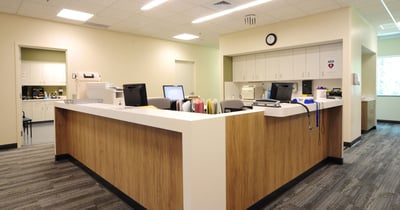
For most business owners, the short-term benefits of leasing their building are attractive, but we’re guessing that most owners would favor owning their building and having control of their business use at a fixed cost. For doctors who own their own practice and will likely stay in their location for 7 or more years1, owning their building can be a great investment for their future while allowing them to have a fixed expense until the building is paid off. As a contractor who specializes in both construction and leaseback services, we can educate doctors on how to leverage programs, accounting processes, and legal structures to make it more lucrative to own your medical office.
Note: we are passing along the knowledge that there are building ownership options and programs available, however, we recommend and advise that you contact your CPA and/or attorney before taking the steps featured here.
Most medical practices would qualify for the SBA 504 loan, which requires a lesser down payment (as low as 10%) then funds 50% of the cost through the Certified Development Company (CDC) at a lesser, fixed interest rate for 10 – 20 years. The remaining 40% is financed through a traditional commercial loan. This program works well for small businesses who are growing, but don’t have a lot of working capital to expend on real estate, improvements or equipment. Being able to finance 80-90% of the cost couldn’t be a better deal for these businesses. For more qualifying information visit the SBA website or read our blog on the topic.
Lease the Building from Yourself for a Tax Reduction
By forming an LLC to purchase your medical office, your medical practice will be able to lease the building from your LLC, deduct the payment on the practice’s taxes, and your LLC members would be taxed on their individual taxes as a pass-through. This would eliminate the tax for your practice and LLC members would be taxed at a lesser rate for the building2.
Cost Segregation for Tax Savings
For business owners who purchase or build a building, a CPA can complete a cost segregation study to determine elements of a building that can be depreciated on a different schedule than the rest of the building. For instance, parts of your building that are considered "personal property or land improvements" can be segregated (i.e. desks, chairs, light fixtures, accent lighting, sidewalks, and landscaping). The cost of these portions of your building can be taxed on different tax schedules, 5, 7, or 15 years rather than the 39 year schedule your building will span. (Wikipedia) This will allow you to defer taxes and help you improve current cash flow3. An even more in depth and professional explanation from a qualified CPA is included through the following link. 
Accelerated Depreciation for More Tax Savings
Your building has a set period of time for useful life, by which the building depreciates each year. Accelerated Depreciation is an accounting process that allows you to depreciate the building more in the beginning of its useful life. Paying the larger amount in the beginning lowers your net income, which you are taxed upon. So having a lower net income in turn would lower your taxes. Good resources to better understand this process are http://crfb.org/blogs/tax-break-down-accelerated-depreciation and http://content.moneyinstructor.com/1509/calculatingdeprectiation.html .
Return on Your Investment
Probably the most enticing part of owning your own building is the opportunity to make a profit on the sale of it when you no longer need it. Another option would be to lease it to a new tenant when you retire and bring in ongoing income when you’re retired from the practice.
Buying a building doesn’t work for every doctor who owns his or her practice, but we wanted to make sure that you had considered all the facts. Whether it’s construction, remodel, or leaseback, we are able to accommodate your needs. Call Michael Shepard, Dr. PH, to discuss your building options. His background in the medical and construction industries will help guide you as you contemplate the future of your practice.
1 Fitsmallbusiness.com http://fitsmallbusiness.com/buying-vs-leasing-commercial-real-estate/
2 Beckner & Associates http://www.becknerassociates.com/Should%20I%20Own.htm
3 Ernst & Morris (www.costseg.com/cost-seg.html).

